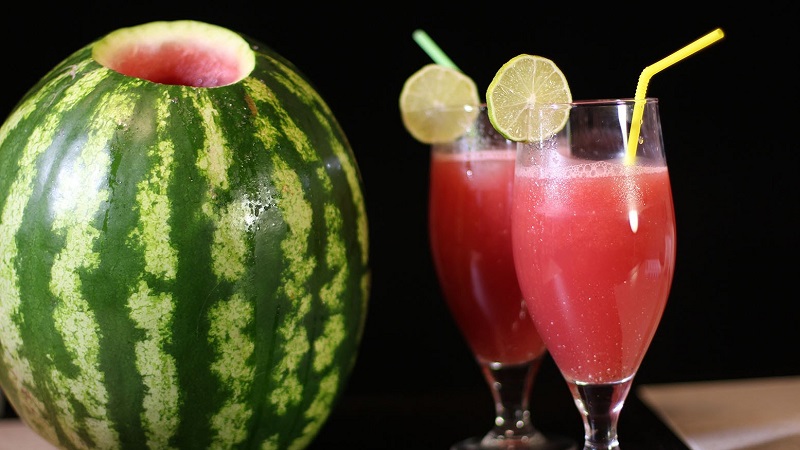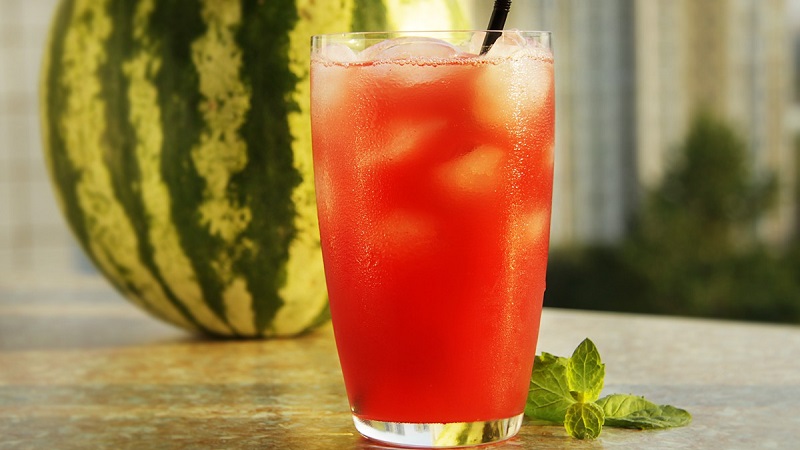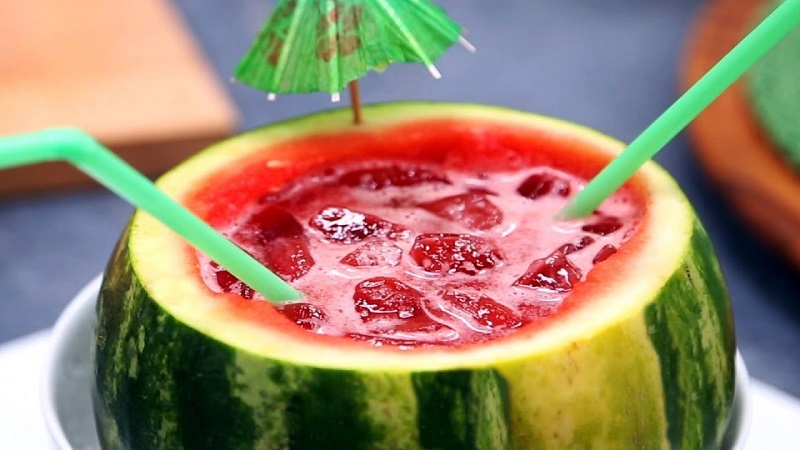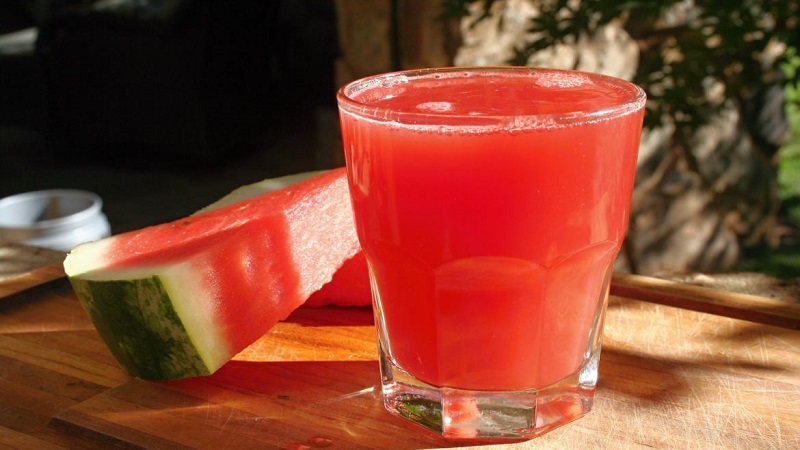Why is watermelon juice useful and how to cook it properly at home
Watermelon juice is practically indistinguishable from the watermelon itself. It has the same chemical composition and is well combined with other fruit juices, which expands the spectrum of its medicinal action, improves taste and enhances the medicinal effect. And the juice can be preserved and drunk at any time of the year.
Next, we will tell you how to properly prepare and consume a watermelon drink, in which cases it benefits the body, and when it can harm.
The content of the article
Watermelon juice as a source of health
Watermelon is 90% water, during the season you can drink its juice every day - it quenches thirst well. Regular consumption of watermelon juice has a beneficial effect on skin condition, heart and kidney function. It has a positive effect on the health of the eyes, liver and lungs, relieves muscle pain, strengthens bones and improves blood formation.
Composition and properties
The pulp of watermelon contains from 5 to 13% of easily digestible sugar in the form of glucose and fructose. During storage, sucrose additionally accumulates.
Among other components of the biological composition, the following are determined:
- pectin;
- proteins;
- alkaline substances;
- ascorbic and nicotinic acid;
- macronutrients: calcium, potassium, phosphorus, sodium, magnesium;
- iron;
- vitamins of groups A, B, C, E, H, PP.
Watermelon juice, if consumed regularly, has the following properties:
- diuretic - increases the rate of urine formation, which helps to reduce the amount of fluid in the tissues and neutralize puffiness;
- choleretic - improves liver function, enhances bile formation and bile secretion into the duodenum;
- anti-inflammatory - inhibits inflammation, protects tissues and organs from the damaging effects of radicals;
- antipyretic - reduces high body temperature, preventing fever;
- laxative - enhances the peristalsis of the large intestine, removes poisons and toxins from the digestive tract, facilitates the process of defecation;
- fortifying - restores the reduced activity of cells of the immune system, increases the body's resistance to the effects of adverse external and internal factors;
- tonic - increases endurance and performance, leads to a sense of well-being.

Calorie content and BZHU
Watermelon is classified as a low-calorie product: 27-38 kcal per 100 g (depending on the variety). Nutritional value per 100 g is: proteins - 0.6 g, carbohydrates - 5.8 g, fats - 0.1 g. Fruit pulp contains up to 92.6% water.
Benefit and harm
Watermelon is a source of a large amount of micro- and macroelements, vitamins, active biological components.
Lycopene is present in the fruit pulp. Its benefits for the body lie in the ability to suppress the activity of inflammation and activate the work of the gastrointestinal tract. In addition, it is a powerful antioxidant and effective prophylactic against digestive cancer. Scientists are developing drugs for cancer based on lycopene.
Watermelon is included in dietary menu... Fruit pulp has a mild laxative effect, removes toxic substances from the body, and reduces the volume of fluid in the tissues. Vegetable fiber cleanses the digestive tract well, normalizes metabolism, lowers cholesterol, improves digestion and quickly provides a feeling of fullness.
Iron and macronutrients have a beneficial effect on the general condition and work of the hematopoietic, digestive, cardiovascular systems, endocrine glands. The content of alkaline substances corrects and restores the acid-base balance, which is why watermelon juice is advised to be taken in case of violations of the acid-base balance.
Watermelon juice is used in medical nutrition for stones in the gallbladder and urinary tract, as a diuretic and laxative for acute and chronic liver diseases, gastrointestinal pathologies. The juice will benefit those who suffer from constipation, nephritis, pyelonephritis. When consumed, the flow of urine increases, and the sugar and water in the pulp are easily absorbed and do not create an additional load on the kidneys.
Watermelon or its juice is recommended for anemia. It replenishes iron deficiency in the body, prevents the occurrence of anemia or relieves its symptoms. Watermelon is useful for pregnant women at all stages: it provides the body with folic acid, which is so necessary for the normal development of the fetus in the womb.
The anti-sclerotic properties of vitamin C and folic acid determine the use of watermelon pulp for the treatment and prevention of diseases of the cardiovascular system. They improve microcirculation, activate tissue metabolism, reduce the risk of blood clots or reduce their size, and stop their increase.
Reference. With regular use of watermelon juice, you can notice improvements in the skin and overall well-being. Vitamin A stimulates tissue growth and renewal, refreshes and moisturizes the skin.
Like all products, watermelon has a “reverse side of the coin”. It has the ability to accumulate nitrates in the fruit pulp. Sometimes its use can provoke vomiting, nausea, diarrhea and stomach pains. Children have dyspeptic symptoms in the form of heartburn, belching, and a feeling of fullness in the abdomen.

How to properly squeeze watermelon juice
To begin with, we will learn how to choose the right watermelon in order to prepare not only tasty, but also healthy juice.
The biological period of ripening of watermelon begins in mid-August, it should not be consumed earlier, since the probability of nitrate content is high. The fruits should be bright and regular in shape, the top layer should be shiny, without a matt bloom, with a dry peduncle and a pronounced striped pattern, without cracks, dents, spots and scratches. Through microcracks, especially if fruits are stored along gas-polluted roads, infections, carcinogens and other toxic substances penetrate.
After cutting, pay attention to the pulp: natural pulp has grains, pink or red, juicy and sweet in taste. If it is smooth and purple, it indicates that the watermelon was grown with nitrates and should not be eaten, especially for children.
Council. Experts recommend buying watermelons near the field where they were grown or in the market. Ideally, the fruit should weigh between 6 and 10 kg: large fruits are often oversaturated with saltpeter, and small ones, as a rule, are unripe.
There are several options for making watermelon juice at home. Let's consider three main ones: using a juicer, a blender and manually.
In a juicer
Cut the watermelon slices peeled from the peel and seeds into small pieces of arbitrary size, pass through a juicer. Pour the drink into a glass, add ice, if desired, you can add mint sprigs and lime. The juice is ready to drink. It is not stored for long, 2-3 hours at a temperature of 3 to 6⁰С.
For a juicer, you can use the unpeeled watermelon pulp along with the seeds. Such a drink will bring more benefits to the body, since most of the vitamins are contained in the rind, and the seeds are rich in fatty acids.

Using a blender
Peel the watermelon and seeds, cut into small cubes, about 2x2 cm, gently pour into the blender bowl, beat until smooth. Add a few tablespoons of powdered sugar or honey if desired. To get a thicker and immediately chilled drink, beat the fruit pulp with ice cubes.
Reference. Watermelon goes well with lemon juice and mint. To prepare such a drink, add the juice of one lemon, 5-6 sprigs of mint per two medium slices of watermelon to the blender bowl. Also, its taste is in harmony with raspberries and pomegranates.
Manually
Wash the ripe fruit, peel it, cut the pulp into small pieces. Use a kitchen sieve to separate the liquid. Transfer the pulp to a sieve, chop with a crush or spoon until puree.
Wrap the rest in cheesecloth folded in several layers, squeeze out the juice. It is better to drink the drink chilled, for this you need to let it brew in the refrigerator or add a few ice cubes.
How to drink
Adults consume 200-400 ml of watermelon juice half an hour before meals or between meals. The nutritionist recommends the daily allowance individually, taking into account the general condition health, age, concomitant diseases and contraindications.
IN children's menu watermelon pulp or its juice is included after the child turns one year old. At the age of 2-3 years, they offer a small piece at a time or 20-50 ml of juice.
Watermelon juice recipe for the winter
Ingredients for 5 liters of juice:
- 8-9 kg of pulp;
- 2 tsp without a slide of citric acid;
- 250-300 g of sugar.
Preparation:
- Peel the watermelon, remove the seeds, cut into small pieces.
- Pour the fruits into a clean metal container, add sugar and citric acid, mix.
- Cook over low heat, stirring constantly. After boiling, stand for another 4-5 minutes.
- Sterilize jars and lids, pour the juice. Place inverted jars in a warm place, wrap with a blanket, leave for 1-2 days until they cool completely.
- Store the juice in the cellar, in the absence of it - in a dark and cool place. It is advisable to use the blanks in the winter, before the onset of the new season.
Council.There are various ways to sterilize jars. It is convenient to do this in the oven, since many cans can be put there at once. To do this, they must be thoroughly washed with soda, together with the lids, put in a cold oven upside down. Set the temperature to 120 degrees for 12-15 minutes.
Another way to make watermelon juice for the winter is with a juicer. Cut the peeled watermelon into slices, remove the seeds, transfer the pulp into a mesh colander. Pour water into the lower saucepan, put on the stove. When the water boils, put a saucepan on top to accumulate juice, then a colander with fruit pulp, cover with a lid. Pour the prepared juice into jars and preserve.

Side effects and contraindications
There are a number of diseases and pathological conditions in which experts recommend refusing or limiting the use of watermelon juice. These include:
- sugar diabetes 1-2 types;
- kidney stone disease during an exacerbation;
- diseases of the pancreas and prostate glands, proceeding in severe form;
- allergies one or more components;
- intolerance to lactose, fructose, sucrose;
- pancreatitis;
- diarrhea;
- the formation of large stones in the gallbladder and bile ducts.
Drinking watermelon juice in moderation is essential to get the most out of your health benefits. Side effects in the form of edema can occur if you mix watermelon with pickles, as salt retains fluid in the body. Watermelons grown with the use of nitrates are capable of causing harm: this threatens with poisoning, intestinal upset in the form of diarrhea, heartburn, heaviness and pain in the stomach.
Conclusion
Watermelon juice is tasty and healthy. It quenches thirst well and quickly saturates the body.Due to its low calorie content and the presence in the composition of a large amount of vitamins, micro- and macroelements, it is included in the dietary and medical menu. Such juice is useful for the treatment and prevention of diseases of the cardiovascular, digestive and urinary systems.
You can make watermelon juice and make preparations for the winter at home. However, you will only get health benefits if you buy a natural, nitrate-free fruit.